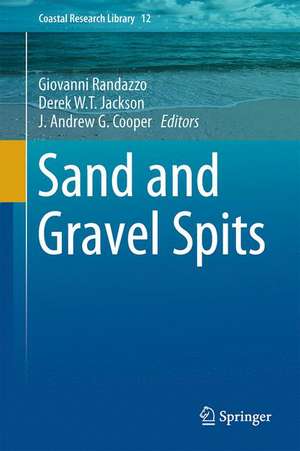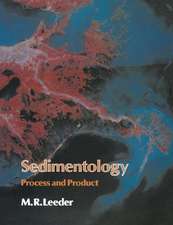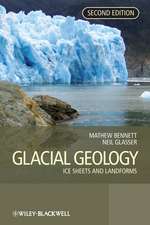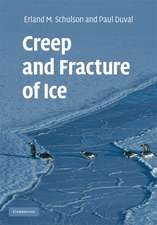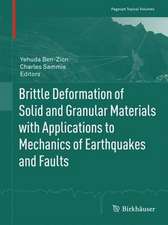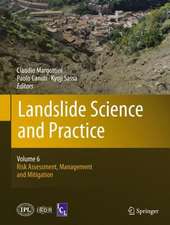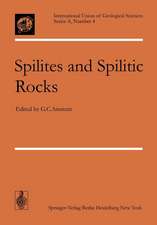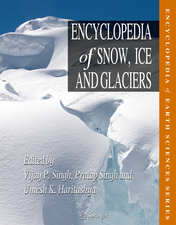Sand and Gravel Spits: Coastal Research Library, cartea 12
Editat de Giovanni Randazzo, Derek W.T. Jackson, J. Andrew G. Cooperen Limba Engleză Hardback – 30 apr 2015
Spits are unique natural environments whose evolution is linked to the adjacent coast and near shore morphology, sediment supply, coastal dynamics and sea-level change. Over the past century, Global Mean Sea Level (GMSL) has risen by 10 to 20 centimetres and many coastal spits represent the first sentinel against coastal submersion.
Scientific research indicates that sea levels worldwide have been rising at a rate of 3.5 millimetres per year since the early 1990s, roughly twice the average speed of the preceding 80 years. This trend, linked to global warming will undoubtedly cause major changes in spit morphology.
Spits are highly mobile coastal landforms that respond rapidly to environmental change. They therefore represent a signature of past environmental change and provide a landform indicator of climate change.
Din seria Coastal Research Library
- 18%
 Preț: 809.07 lei
Preț: 809.07 lei - 15%
 Preț: 646.62 lei
Preț: 646.62 lei - 15%
 Preț: 654.12 lei
Preț: 654.12 lei - 18%
 Preț: 968.65 lei
Preț: 968.65 lei - 18%
 Preț: 1249.93 lei
Preț: 1249.93 lei -
 Preț: 395.47 lei
Preț: 395.47 lei - 20%
 Preț: 757.62 lei
Preț: 757.62 lei - 18%
 Preț: 1417.72 lei
Preț: 1417.72 lei - 18%
 Preț: 726.37 lei
Preț: 726.37 lei - 18%
 Preț: 971.01 lei
Preț: 971.01 lei - 18%
 Preț: 985.24 lei
Preț: 985.24 lei - 15%
 Preț: 641.71 lei
Preț: 641.71 lei - 15%
 Preț: 644.30 lei
Preț: 644.30 lei - 15%
 Preț: 643.84 lei
Preț: 643.84 lei - 20%
 Preț: 572.09 lei
Preț: 572.09 lei - 24%
 Preț: 809.95 lei
Preț: 809.95 lei - 24%
 Preț: 698.82 lei
Preț: 698.82 lei - 24%
 Preț: 840.68 lei
Preț: 840.68 lei - 24%
 Preț: 825.72 lei
Preț: 825.72 lei - 24%
 Preț: 1257.51 lei
Preț: 1257.51 lei - 24%
 Preț: 819.29 lei
Preț: 819.29 lei - 24%
 Preț: 1518.91 lei
Preț: 1518.91 lei - 23%
 Preț: 1377.42 lei
Preț: 1377.42 lei - 20%
 Preț: 608.36 lei
Preț: 608.36 lei - 24%
 Preț: 763.00 lei
Preț: 763.00 lei - 15%
 Preț: 699.28 lei
Preț: 699.28 lei - 20%
 Preț: 624.69 lei
Preț: 624.69 lei -
 Preț: 400.03 lei
Preț: 400.03 lei - 20%
 Preț: 552.37 lei
Preț: 552.37 lei - 24%
 Preț: 671.00 lei
Preț: 671.00 lei -
 Preț: 412.27 lei
Preț: 412.27 lei
Preț: 649.54 lei
Preț vechi: 764.17 lei
-15% Nou
Puncte Express: 974
Preț estimativ în valută:
124.31€ • 129.30$ • 102.62£
124.31€ • 129.30$ • 102.62£
Carte tipărită la comandă
Livrare economică 12-26 aprilie
Preluare comenzi: 021 569.72.76
Specificații
ISBN-13: 9783319137155
ISBN-10: 3319137158
Pagini: 339
Ilustrații: IX, 344 p. 142 illus., 96 illus. in color.
Dimensiuni: 155 x 235 x 22 mm
Greutate: 0.67 kg
Ediția:2015
Editura: Springer International Publishing
Colecția Springer
Seria Coastal Research Library
Locul publicării:Cham, Switzerland
ISBN-10: 3319137158
Pagini: 339
Ilustrații: IX, 344 p. 142 illus., 96 illus. in color.
Dimensiuni: 155 x 235 x 22 mm
Greutate: 0.67 kg
Ediția:2015
Editura: Springer International Publishing
Colecția Springer
Seria Coastal Research Library
Locul publicării:Cham, Switzerland
Public țintă
ResearchCuprins
Evolution of sand spits along the Caribbean coast of Colombia: natural and human influences.- Patterns of sand spit development and their management implications on deltaic, drift-aligned coasts: the cases of the Senegal and Volta River delta spits, West Africa.- El Paramo Transgressive Gravel Spit, Tierra Del Fuego, Argentina.- Gravel spit-inlet dynamics: Orford Spit, UK.- Aeolian sand invasion: georadar signatures from the Curonian Spit dunes, Lithuania.- The joint history of Tróia peninsula and Sado ebb-delta.- The Historical Evolution of the Tindari-Marinello Spit (Italy - Sicily).- Anthropogenic influence on Spit Dynamics at Various Timescales: Case Studie in the Bay of Cadiz (Spain).- The Development and Management of the Dingle Bay Spit-Barriers of Southwest Ireland.- Polish spits and barriers.- Tidal Flat-Barrier Spit Interactions in a Fetch-Limited, Macro-Tidal Embayment, Lubec, Maine, USA.- Sandy spits and their mathematical modeling.- Spits on the French Atlantic and Channel coasts: morphological behaviour and present management policies.- The sand spits of the Rhône River delta: formation, dynamics, sediment budgets and management.- Long-, mid- and short-term evolution of coastal gravel spits of Brittany, France.- Morphological characterization and evolution of Tahadart littoral spit, Atlantic coast of Morocco.- Geomorphology and internal sedimentary structure of a landward migrating barrier spit (Southern Sylt/ German Bight): Insights from GPR surveys.- Morphology and the Cyclic Evolution of Danube Delta Spits.
Textul de pe ultima copertă
This book draws together a series of studies of spit geomorphology and temporal evolution from around the world. The volume offers some unique insights into how these landforms are examined scientifically and how we as humans impact them, offering a global perspective on spit genesis and evolution.
Spits are unique natural environments whose evolution is linked to the adjacent coast and nearshore morphology, sediment supply, coastal dynamics and sea-level change. Over the past century, Global Mean Sea Level (GMSL) has risen by 10 to 20 centimetres and many coastal spits represent the first sentinel against coastal submersion.
Scientific research indicates that sea levels worldwide have been rising at a rate of 3.5 millimetres per year since the early 1990s, roughly twice the average speed of the preceding 80 years. This trend, linked to global warming will undoubtedly cause major changes in spit morphology.
Spits are highly mobile coastal landforms that respond rapidly to environmental change. They therefore represent a signature of past environmental change and provide a landform indicator of climate change.
Spits are unique natural environments whose evolution is linked to the adjacent coast and nearshore morphology, sediment supply, coastal dynamics and sea-level change. Over the past century, Global Mean Sea Level (GMSL) has risen by 10 to 20 centimetres and many coastal spits represent the first sentinel against coastal submersion.
Scientific research indicates that sea levels worldwide have been rising at a rate of 3.5 millimetres per year since the early 1990s, roughly twice the average speed of the preceding 80 years. This trend, linked to global warming will undoubtedly cause major changes in spit morphology.
Spits are highly mobile coastal landforms that respond rapidly to environmental change. They therefore represent a signature of past environmental change and provide a landform indicator of climate change.
Caracteristici
First time such a collection of works is brought together to examine global location of coastal spits Possible indicator environment for sea-level rise and other climate change impacts Paleo-indicator environment for climate change patterns Includes supplementary material: sn.pub/extras
